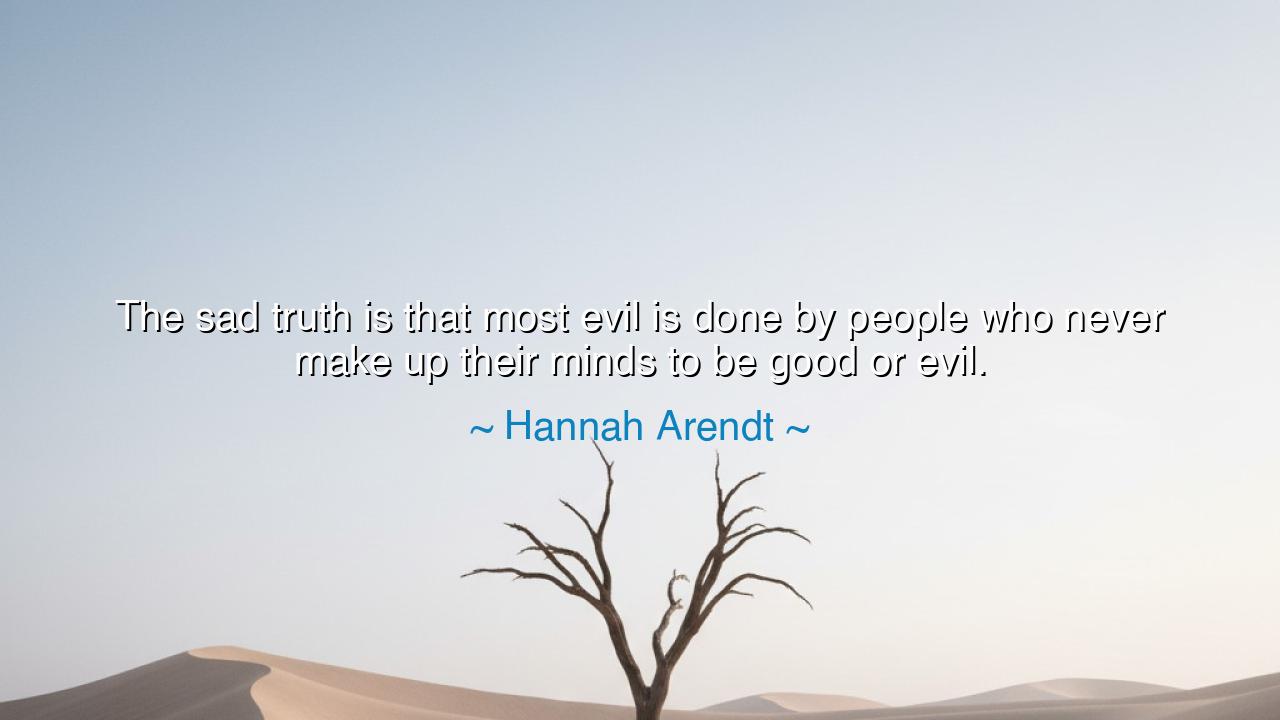
The sad truth is that most evil is done by people who never make
The sad truth is that most evil is done by people who never make up their minds to be good or evil.






The philosopher Hannah Arendt, whose mind shone like a lamp amid the darkness of the twentieth century, once wrote: “The sad truth is that most evil is done by people who never make up their minds to be good or evil.” In this piercing reflection, Arendt exposes one of the most unsettling realities of the human soul—that evil often does not roar with hatred, nor stride forth with malice, but walks quietly in the hearts of those who refuse to choose. It is the evil of indifference, of obedience without thought, of conscience left dormant. Through her words, she warns us that the greatest dangers to humanity do not always come from monsters, but from the ordinary who fail to awaken their moral will.
The origin of this quote is rooted in Arendt’s meditations on the Holocaust and her observations of the trial of Adolf Eichmann, one of its architects. Expecting to confront a monster of hate, she instead found a man who was disturbingly ordinary—polite, unimaginative, a bureaucrat who claimed merely to be “following orders.” This discovery led Arendt to coin her famous concept, “the banality of evil.” What she saw in Eichmann was not the face of demonic intent, but the emptiness of conscience: a man who had surrendered his moral judgment to the machinery of authority. From this revelation came her warning—that thoughtlessness and moral apathy are far more dangerous than the passions of the wicked.
In her words, “most evil is done by people who never make up their minds,” we are confronted with the tragedy of moral laziness. Evil thrives not because all men are cruel, but because too many men are neutral—because they let the tide carry them, because they obey when they should question, because they silence their conscience in exchange for comfort. History is filled with such souls: men and women who stood by while injustice ruled, telling themselves it was not their place to act. Theirs is the evil of the unexamined life, the sin of silence in the presence of wrong.
Consider the story of Oskar Schindler, a man who lived during the same dark era Arendt studied. At first, he was not a hero—he was a businessman, ambitious and indifferent, who joined the Nazi Party for profit. Yet as he watched the suffering of the Jews around him, something within him awoke. He made up his mind. He chose to act, risking his wealth and his life to save over a thousand people. Schindler’s story stands as a living mirror to Arendt’s words. For it shows what happens when one does make up their mind—to be good, to resist, to defy evil with humanity. The difference between indifference and action is the difference between destruction and redemption.
Arendt’s insight is not confined to her century. In every age, evil takes new forms, but it is always nourished by the same apathy. When people look away from injustice, when they say “It is not my concern,” when they obey laws that contradict the laws of conscience, they become vessels through which harm spreads unseen. The ancient sages of every culture knew this truth. In the Bhagavad Gita, the warrior Arjuna is told that inaction itself can be sin—that to refuse one’s moral duty is to serve chaos. Likewise, Arendt reminds us that the choice to not choose is itself a choice—a surrender of the soul to the void.
The lesson in her words is both stern and hopeful: each human being carries within them the power of discernment, the sacred duty to think, to judge, to act with integrity. It is not enough to say, “I meant no harm.” The question is whether one’s inaction allowed harm to grow. The antidote to evil, Arendt tells us, is moral awareness—a habit of thought that weighs right and wrong not by command, but by conscience. To make up one’s mind to be good is not to claim perfection, but to commit to vigilance, reflection, and courage, even when the world encourages blindness.
Therefore, my child, remember this: the quiet heart that refuses to think can do more damage than the loudest tyrant. Never surrender your moral clarity to comfort or fear. When the world tells you to obey without question, pause and think. When you witness suffering, stand and speak. For each time a person chooses conscience over convenience, the tide of evil is pushed back, and light reclaims a little of the world’s darkness.
Thus, as Hannah Arendt teaches, the line between good and evil does not lie between nations or races, but runs through every human heart. The sad truth is that many never choose—but the hopeful truth is that you can. Make up your mind, then—not once, but every day—to be awake, to be just, to be kind. For the mind that thinks and the heart that acts together form the only true defense against the quiet and creeping evil that thrives where thought has died.






AAdministratorAdministrator
Welcome, honored guests. Please leave a comment, we will respond soon